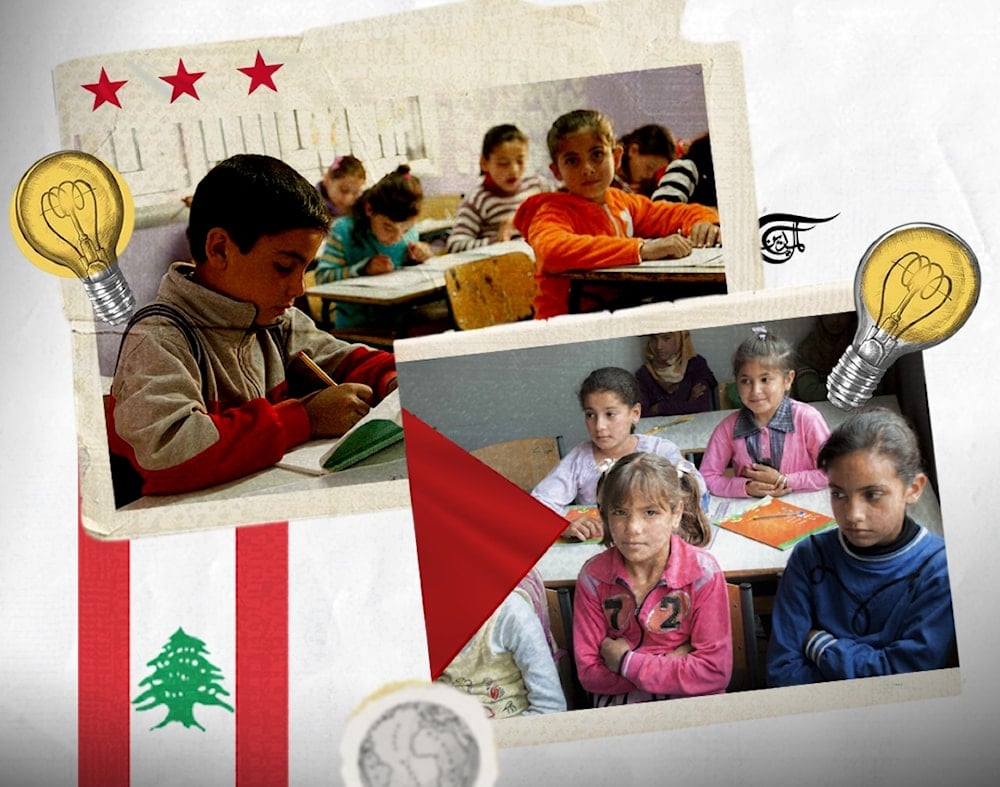Cognitive potential in limbo: Critical analysis of gifted education deficiencies in Lebanese refugee camps
Several factors invariably render many gifted refugee children in Lebanon invisible, their potential silenced amid the exigencies of immediate humanitarian crises.
-

The impediments to identifying giftedness within refugee populations are multifaceted and profound (Illustrated by Batoul Chamas; Al Mayadeen English)
Within the densely populated confines of Lebanon’s refugee camps, a significant yet often unacknowledged educational challenge persists: the systemic oversight concerning the needs of gifted children. Whilst global educational paradigms frequently prioritize fundamental access, literacy, and basic rights, the distinct requirements of high-potential learners within displaced populations remain conspicuously absent from mainstream discourse and intervention. The lacuna of formal identification systems, bespoke educational frameworks, and requisite support structures invariably renders many gifted refugee children in Lebanon invisible, their potential silenced amid the exigencies of immediate humanitarian crises.
Lebanon, currently shouldering the burden of approximately 1.5 million Syrian refugees alongside some 489,292 UNRWA-registered Palestinian refugees as of March 2023, consequently, exhibits the highest refugee-to-population ratio globally. Embedded within these displaced communities are children demonstrating exceptional cognitive aptitude, creative ingenuity, or leadership capabilities. However, a critical deficit exists: Lebanon lacks a comprehensive national gifted education policy inclusive of refugee or public-school demographics, and concurrently, there is a dearth of empirical data or scholarly literature documenting the prevalence of identified giftedness among refugee children within its borders (Yamin & El-Khoury, 2022; Al-Hroub, 2022). This absence of data transcends mere administrative oversight; it stands as a stark manifestation of systemic neglect. Without mechanisms for assessment or recognition, giftedness remains a latent, unseen phenomenon, thereby denying children possessing the potential for leadership and innovation the opportunity to actualize their capabilities.
The impediments to identifying giftedness within refugee populations are multifaceted and profound. The Lebanese Ministry of Education currently implements no standardized mechanisms for screening or supporting gifted students, a systemic void particularly deleterious in under-resourced contexts such as refugee camps, where exceptional potential is often unanticipated or misconstrued (Al-Hroub, 2022). Research conducted by Karam and Husseini (2022) illuminated a prevalent disjuncture: most Lebanese educators surveyed equated giftedness primarily with conventional academic attainment and reported negligible training in discerning or cultivating diverse manifestations of giftedness. Furthermore, Jouni (2023) emphasized that characteristic gifted traits, among them advanced moral reasoning, pronounced curiosity, and heightened emotional sensitivity, are frequently misinterpreted as insubordination or behavioral anomalies, a misattribution particularly prevalent among refugee students concurrently navigating trauma.
Compounding these pedagogical challenges is the scarcity of accessible, culturally attuned assessment instruments. Numerous standardized intelligence or aptitude tests are unavailable in Arabic or presuppose a level of prior formal schooling that refugee children frequently lack (Al-Hroub, 2022). Prevailing standardized testing practices often inadvertently perpetuate systemic inequities, favoring children from more stable and affluent socio-economic backgrounds. Moreover, regional cultural perceptions can inhibit the recognition of giftedness. Traits, such as challenging authority or articulating strong, independent opinions, commonly observed in gifted learners, are often perceived as disruptive or incompatible with conservative social mores (Karam & Husseini, 2022).
The consequences of this neglect extend beyond mere academic stagnation. Gifted refugee children are rendered particularly vulnerable to social and emotional distress when their salient abilities and distinctive needs remain unacknowledged. These students frequently manifest heightened moral sensitivity, profound empathy, and a propensity for existential inquiry—inherent traits that, absent appropriate supportive interventions, can precipitate feelings of profound alienation or engender emotional misdiagnosis (Neihart et al., 2016; Al-Hroub, 2022). Consequently, some may be erroneously categorized as defiant, inattentive, or exhibiting anxiety, whilst others may actively suppress their exceptional capabilities in an endeavor to achieve social conformity. Jouni (2023) cogently warns that such students often confront a debilitating identity conflict, compelled to navigate the pervasive trauma of displacement concurrently with the protracted struggle of unmet intellectual exigencies. Over protracted periods, these intersecting factors insidiously erode intrinsic motivation, self-esteem, and a fundamental sense of belonging within their immediate social and educational milieus.
Social dynamics further serve to complicate the lived experiences of gifted refugee students. Academic success, while intrinsically valuable, does not invariably elicit commendation within the exigencies of refugee camp settings, where the imperative of daily survival often supersedes scholastic achievement. Gifted children may, regrettably, encounter resentment from their peers, be perceived as fundamentally different, or experience overt social exclusion. This adverse social dynamic further contributes to patterns of classroom withdrawal, disengagement from learning activities, and ultimately, underperformance (UNESCO, 2020). In numerous instances, these students undergo a process of disillusionment with the formal educational system, interpreting the persistent absence of intellectual challenge and the lack of substantive recognition as an implicit signal that their academic endeavors hold negligible value.
Notwithstanding these considerable obstacles, several notable narratives illuminate the possibilities when gifted refugee students receive even minimal support. Abed, a 12-year-old Syrian refugee in Lebanon, exhibited exceptional mathematical prowess. Encouraged by a Lebanese teacher who discerned his talent, he assisted peers in improving their academic performance and was nominated to represent his school at international conferences in India and the US, opportunities ultimately rendered inaccessible due to his refugee status (UNHCR, 2018). Another exemplar is Mohammed Ammar Said Koshak, a Syrian refugee who achieved the second-highest ranking in Lebanon’s national Brevet examinations, surmounting the dual challenges of displacement and systemic barriers (Theirworld, 2016). Yusef Al-Moulieh similarly distinguishes himself as a Syrian student who, after fleeing to Lebanon, attained the highest graduation average among Syrian peers and secured a scholarship for medical studies at the American University of Beirut (Society for Social Support and Education, n.d.).
Perhaps the most widely recognized case is that of Ismail Ajjawi, a Palestinian refugee from Lebanon’s Al-Buss camp, who earned the premier score in the life science stream of the Official Lebanese Baccalaureate exams in southern Lebanon. Subsequently awarded a scholarship to Harvard University, his entry into the United States was initially obstructed due to content discovered on his acquaintances' social media profiles. Following advocacy and reassessment, his entry was permitted, and his trajectory became a potent symbol of hope for students throughout the region (UNRWA, 2019). These success stories, however poignant, function primarily as exceptions that underscore the general rule of neglect; they reveal the latent potential awaiting recognition but do not reflect normative outcomes.
The pervasive invisibility of gifted refugee children in Lebanon stems not from an intrinsic deficit of talent but rather from a fundamental lack of systems architected to identify and cultivate such potential. This profound silence, evident in both policy frameworks and the existing body of literature, accentuates the exigency for substantive change. To effectively address this silent crisis and to ensure the actualization of potential within this marginalized population, several key strategic recommendations warrant immediate consideration by relevant stakeholders.
Firstly, the Lebanese Ministry of Education must prioritize the establishment of comprehensive and inclusive national gifted education frameworks that explicitly incorporate refugee populations within their purview (Al-Hroub, 2022). Such policy reform should articulate a clear commitment to identifying and supporting gifted learners irrespective of their displacement status or socio-economic background.
Secondly, a critical investment in targeted teacher training programs within both public and UNRWA-administered schools is indispensable. These programs must be meticulously designed to equip educators with the requisite knowledge and skills to recognize the varied expressions of giftedness that may manifest in refugee children, extending beyond conventional academic metrics to encompass creativity, problem-solving acumen, and leadership potential (Jouni, 2023).
Thirdly, the development and implementation of culturally responsive assessment methodologies are paramount. Existing testing tools, often culturally biased and ill-suited for learners with interrupted educational experiences, must be augmented or replaced by instruments that are appropriately translated, rigorously culturally validated for the Lebanese context, and sufficiently adaptable to accommodate the diverse learning trajectories of non-traditional learners (Al-Hroub, 2022).
Finally, the empowerment of local communities, including families residing within the refugee camps and community leaders, represents a crucial element of a holistic intervention strategy. By providing these key stakeholders with relevant information and resources, they can play an instrumental role in the early identification and initial nurturing of gifted children within their own social and cultural contexts (Jouni, 2023).
Absent the diligent and sustained implementation of these evidence-based recommendations, an entire demographic of high-potential learners will continue to languish in obscurity, their invaluable contributions to society forever diminished. It is therefore incumbent upon all relevant stakeholders to heed these critical imperatives, thereby ensuring that the hitherto lost voices of talent among Lebanon's refugee children are finally heard and that their inherent capabilities are afforded the opportunity to flourish.
References:
Al-Hroub, A. (2022). Gifted education in Lebanon: Addressing marginalization and learning diversity. Cogent Education, 9(1), Article 2073644. https://doi.org/10.1080/2331186X.2022.2073644
Jouni, N. (2023). Education for gifted and talented children in the Arab world: Challenges and solutions. In N. Jouni & A. Al-Hroub (Eds.), Gifted education in the Middle East and North Africa (pp. 123–139). Springer. https://doi.org/10.1007/978-3-031-34779-5
Karam, A., & Husseini, D. (2022). Perceptions of giftedness among Lebanese teachers. Middle Eastern Journal of Educational Studies, 14(2), 85–101.
Neihart, M., Pfeiffer, S. I., & Cross, T. L. (2016). The social and emotional development of gifted children: What do we know? (2nd ed.). Prufrock Press.
Society for Social Support and Education. (n.d.). Success stories. https://socialsupporteducation.org/success-stories/
Theirworld. (2016). Syrian refugee student scores highest in Lebanon exams. https://theirworld.org/news/syrian-refugee-student-scores-highest-in-lebanon-exams
UNESCO. (2020). Education in emergency situations: Inclusion and access for refugee learners in Lebanon. UNESCO Publishing.
UNHCR. (2018). UNHCR’s 2018 education report: Turn the tide. https://www.unhcr.org/publications/education/5be2a9bd4/2018-education-report-turn-tide.html
UNHCR. (2024). Lebanon fact sheet. https://www.unhcr.org/lb
UNRWA. (2019, August 28). Harvard-bound Ismail Ajjawi: An inspiration for fellow UNRWA students. https://www.unrwa.org/newsroom/press-releases/harvard-bound-ismail-ajjawi-inspiration-fellow-unrwa-students
Yamin, S., & El-Khoury, M. (2022). Gifted education in Lebanon: Re-examining the role of educational and learning capitals. International Journal of Gifted Education, 35(1), 23–39.

 Dana Kahil
Dana Kahil
 9 Min Read
9 Min Read











